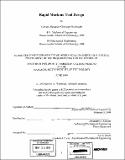| dc.contributor.advisor | Alexander Slocum. | en_US |
| dc.contributor.author | Hochmuth, Carsten Alexander | en_US |
| dc.contributor.other | Massachusetts Institute of Technology. Dept. of Mechanical Engineering. | en_US |
| dc.date.accessioned | 2005-08-22T20:41:25Z | |
| dc.date.available | 2005-08-22T20:41:25Z | |
| dc.date.copyright | 1999 | en_US |
| dc.date.issued | 1999 | en_US |
| dc.identifier.uri | http://hdl.handle.net/1721.1/9373 | |
| dc.description | Thesis (Ph.D.)--Massachusetts Institute of Technology, Dept. of Mechanical Engineering, 1999. | en_US |
| dc.description | Includes bibliographical references (p. 206-208). | en_US |
| dc.description.abstract | Rapid Machine Tool Design encompasses new materials and manufacturing and design processes that increase the speed and flexibility of the machine tool development process. Rapid design implies increased concurrency and overlap of design process steps, and it allows a quick and efficient response to market opportunities for new types of components or machinery. Rapid manufacturing implies use of new materials with reduced lead times for tooling and "one-off" components, simplified and deterministic processes and cost effective methods for customization and modular system design. This thesis describes design and manufacturing methods for polymer concrete structures in precision machine tools. The focus is on the modularity and unique capabilities of this process for rapid development of manufacturing equipment. Detailed material properties and process descriptions are presented. Traditionally, only the polymer concrete casting process is described, and the thesis expands on the discussion by reviewing the design process and other phases of the full machine tool life cycle. An understanding of the critical factors in the material composition and processing helps the designer understand possible variations in the polymer concrete mechanical properties and quality. This thesis contributes to the body of work on polymer concrete by providing a detailed guide for designing structural components, with analytical tools were applicable and examples from an actual machine design project. This thesis presents a comprehensive set of new design guidelines on how to build polymer concrete parts and tooling, merging the needs of the machine designer and the tooling builder. The thesis also presents a case study of a complete machine tool design with a polymer concrete structure. Methods and guidelines described in this thesis are successfully applied in the development and manufacture of the machine tool. The case study and the design chapters demonstrate that use of polymer concrete can be an enabling element for rapid machine tool design. | en_US |
| dc.description.statementofresponsibility | by Carsten Alexander Christoph Hochmuth. | en_US |
| dc.format.extent | 208 p. | en_US |
| dc.format.extent | 19719370 bytes | |
| dc.format.extent | 19719129 bytes | |
| dc.format.mimetype | application/pdf | |
| dc.format.mimetype | application/pdf | |
| dc.language.iso | eng | en_US |
| dc.publisher | Massachusetts Institute of Technology | en_US |
| dc.rights | M.I.T. theses are protected by copyright. They may be viewed from this source for any purpose, but reproduction or distribution in any format is prohibited without written permission. See provided URL for inquiries about permission. | en_US |
| dc.rights.uri | http://dspace.mit.edu/handle/1721.1/7582 | |
| dc.subject | Mechanical Engineering. | en_US |
| dc.title | Rapid machine tool design | en_US |
| dc.type | Thesis | en_US |
| dc.description.degree | Ph.D. | en_US |
| dc.contributor.department | Massachusetts Institute of Technology. Department of Mechanical Engineering | |
| dc.identifier.oclc | 44814729 | en_US |
